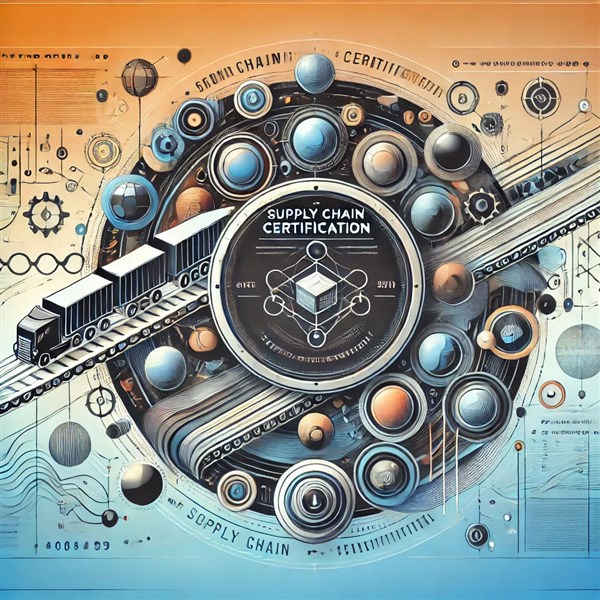
The global economy depends on the seamless movement of goods, services, and information—a process managed by supply chains. Professionals working in supply chain management (SCM) play a critical role in ensuring efficiency and effectiveness within these systems. To excel in this dynamic field, acquiring a supply chain certification is increasingly becoming a valuable asset. But what exactly is a supply chain certification, and why does it matter?
In this blog, we will delve into the concept of supply chain certification, its types, and its importance in building a successful career while driving operational excellence in the supply chain industry.
What is Supply Chain Certification?
A supply chain certification is a professional credential that validates an individual's expertise and knowledge in various aspects of supply chain management. These certifications are typically offered by recognized industry organizations and focus on topics like procurement, logistics, inventory management, demand planning, and supply chain analytics.
Key Features of Supply Chain Certifications:
- Knowledge Validation: Certifications demonstrate that a professional understands supply chain concepts, tools, and best practices.
- Industry Recognition: Certified professionals are often preferred by employers because certifications signal expertise and commitment.
- Continuous Learning: Many certifications require ongoing education to maintain the credential, ensuring that certified individuals stay updated on industry trends.
Why Does Supply Chain Certification Matter?
1. Enhances Career Opportunities
Supply chain certifications can significantly boost your resume, making you stand out in a competitive job market. Employers often prioritize certified candidates for positions requiring specialized skills, such as demand forecasting, inventory control, or logistics management.
2. Boosts Earning Potential
Certified supply chain professionals typically earn higher salaries compared to their non-certified peers. For example, certifications like APICS CPIM (Certified in Production and Inventory Management) and CSCP (Certified Supply Chain Professional) have been shown to enhance earning potential by 20-30% on average.
3. Improves Operational Knowledge
Certifications equip professionals with advanced tools, methodologies, and frameworks to tackle real-world supply chain challenges. By applying these skills, businesses can improve efficiency, reduce costs, and enhance customer satisfaction.
4. Global Recognition
A supply chain certification from a reputable organization is globally recognized, allowing professionals to explore opportunities across industries and geographies.
5. Aligns with Emerging Trends
With the rise of technologies like AI, blockchain, and IoT, certifications often include modules on how to integrate these advancements into supply chain operations, ensuring professionals remain future-ready.
Types of Supply Chain Certifications
Several organizations offer supply chain certifications tailored to various skill levels and career paths. Here are some of the most popular ones:
1. APICS Certifications (Offered by ASCM)
- CPIM (Certified in Production and Inventory Management): Focuses on production planning, inventory management, and supply chain optimization.
- CSCP (Certified Supply Chain Professional): Covers end-to-end supply chain processes, from procurement to delivery.
- CLTD (Certified in Logistics, Transportation, and Distribution): Specialized in logistics, warehousing, and transportation.
2. ISM Certifications (Institute for Supply Management)
- CPSM (Certified Professional in Supply Management): Focused on procurement, supplier relationship management, and strategic sourcing.
- CPSD (Certified Professional in Supplier Diversity): Targets supplier diversity management.
3. CIPS Certifications (Chartered Institute of Procurement and Supply)
Globally recognized, CIPS certifications focus on procurement and purchasing strategies.
4. SCPro (Supply Chain Professional Certification)
Offered by the Council of Supply Chain Management Professionals (CSCMP), this certification targets end-to-end supply chain expertise.
5. Lean Six Sigma Certifications
Although not specific to supply chain, Lean Six Sigma certifications are highly relevant for professionals focused on process improvement and waste reduction.
How to Choose the Right Supply Chain Certification
1. Assess Your Career Goals
Identify your area of interest in the supply chain—be it procurement, logistics, or analytics—and select a certification that aligns with your aspirations.
2. Consider Your Experience Level
- Entry-level professionals may start with certifications like APICS CPIM or foundational CIPS levels.
- Mid-level and senior professionals can pursue advanced credentials like CSCP or CPSM.
3. Evaluate Industry Demand
Research which certifications are most valued in your target industry or geographical region.
4. Check Eligibility Requirements
Some certifications require prior work experience or education in supply chain management.
5. Look for Accreditation
Ensure the certification provider is recognized globally or within your industry.
Steps to Get Certified
-
Research and Choose a Certification
Determine which certification best fits your career stage and objectives. -
Enroll in a Program
Register for a training program or self-study, depending on the certification requirements. -
Prepare for the Exam
Leverage study materials, practice tests, and group discussions to strengthen your understanding of the syllabus. -
Take the Exam
Schedule and appear for the exam, often conducted online or at authorized centers. -
Maintain Certification
Some certifications require continuing education credits or periodic renewals to stay valid.
Challenges in Getting Certified
- Time Commitment: Preparing for certification exams can be time-intensive.
- Cost: Certifications often require significant financial investment, including training and exam fees.
- Complexity: The syllabus can be challenging, particularly for advanced certifications.
Conclusion
Supply chain certification is more than just a professional credential—it is a gateway to career advancement, higher earning potential, and deeper expertise in supply chain management. In a rapidly evolving global market, certifications equip professionals with the tools they need to navigate challenges and drive innovation.
Whether you’re an aspiring supply chain professional or a seasoned expert, earning a supply chain certification is a worthwhile investment in your future.
As a leading IT training company, Koenig Solutions offers a comprehensive range of Supply Chain Training Courses. Our certifications are designed to equip you with the knowledge and skills necessary to excel in the field of supply chain management. With our expert instructors and flexible training options, you can earn your Supply Chain Certification at your own pace and convenience. So, why wait? Boost your career prospects with a Supply Chain Certification from Koenig Solutions today!
Are you ready to elevate your career and make an impact in the world of supply chain management? Start exploring your certification options today!







COMMENT